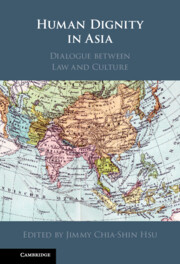Book contents
- Human Dignity in Asia
- Human Dignity in Asia
- Copyright page
- Dedication
- Contents
- Editor and Contributors
- Preface
- Abbreviations
- Introduction Human Dignity, Human Rights, and Cultural Change in Asia
- 1 Human Dignity in Indian Constitutional Adjudication
- 2 The Development of Individual Dignity in Japan
- 3 Constitutional Discourse on Human Dignity in South Korea
- 4 Human Dignity in the Jurisprudence of the Taiwan Constitutional Court
- 5 The Human Dignity Factor
- 6 Human Dignity in the Jurisprudence of the Indonesian Constitutional Court
- 7 Dignity as a Constitutional Value in Hong Kong
- 8 Human Dignity and Relational Constitutionalism in Singapore
- 9 Personal Dignity under Chinese
- 10 Virtue, Dignity, and Constitutional Democracy
- 11 Buddhist Philosophical Approaches to Human Dignity
- 12 Dignity and Status in Ancient and Medieval India
- 13 Human Dignity, Pancasila, and Islam
- 14 Catholicism and Human Dignity in the Philippines
- 15 Protestantism and Human Dignity in South Korea
- Index
14 - Catholicism and Human Dignity in the Philippines
Published online by Cambridge University Press: 26 July 2022
- Human Dignity in Asia
- Human Dignity in Asia
- Copyright page
- Dedication
- Contents
- Editor and Contributors
- Preface
- Abbreviations
- Introduction Human Dignity, Human Rights, and Cultural Change in Asia
- 1 Human Dignity in Indian Constitutional Adjudication
- 2 The Development of Individual Dignity in Japan
- 3 Constitutional Discourse on Human Dignity in South Korea
- 4 Human Dignity in the Jurisprudence of the Taiwan Constitutional Court
- 5 The Human Dignity Factor
- 6 Human Dignity in the Jurisprudence of the Indonesian Constitutional Court
- 7 Dignity as a Constitutional Value in Hong Kong
- 8 Human Dignity and Relational Constitutionalism in Singapore
- 9 Personal Dignity under Chinese
- 10 Virtue, Dignity, and Constitutional Democracy
- 11 Buddhist Philosophical Approaches to Human Dignity
- 12 Dignity and Status in Ancient and Medieval India
- 13 Human Dignity, Pancasila, and Islam
- 14 Catholicism and Human Dignity in the Philippines
- 15 Protestantism and Human Dignity in South Korea
- Index
Summary
This chapter reviews Catholic teachings regarding human dignity and how the Catholic Bishops’ Conference of the Philippines (CBCP) – the official representative of the Catholic hierarchy in the Philippines – has interpreted it in several issue areas, including capital punishment, contraception, poverty, and electoral fraud. Catholic doctrine teaches that all people possess intrinsic dignity because they have been created in the image of God (the imago Dei), thereby imposing certain moral principles regarding the treatment of oneself and others, including solidarity, care for the poor, and the sanctity of human life. The Church’s views have taken on distinct local characteristics shaped by high levels of societal poverty, economic inequality, and corruption, as well as the Church’s historically strong political influence. Catholic bishops have harnessed the concept of human dignity to point out dehumanizing practices in Philippine society and call for greater respect for human life. In recent decades, though, the Church’s moral authority has been severely challenged, revealing the limits of its ability to promote Catholic teachings on human dignity.
Keywords
- Type
- Chapter
- Information
- Human Dignity in AsiaDialogue between Law and Culture, pp. 332 - 355Publisher: Cambridge University PressPrint publication year: 2022

